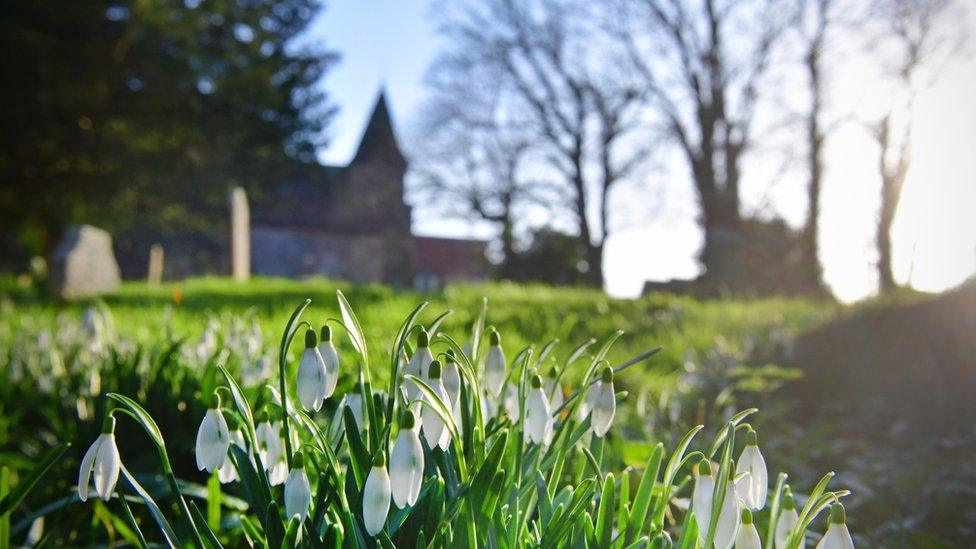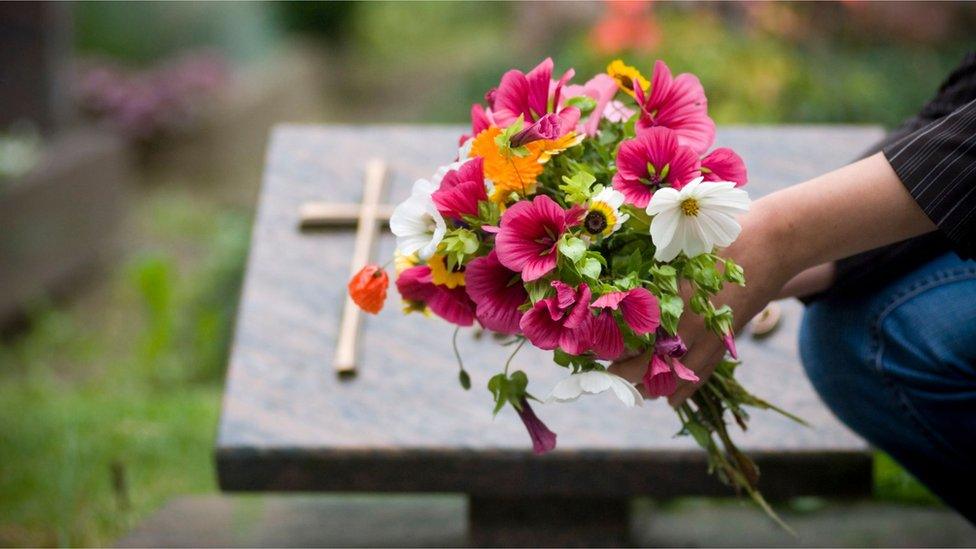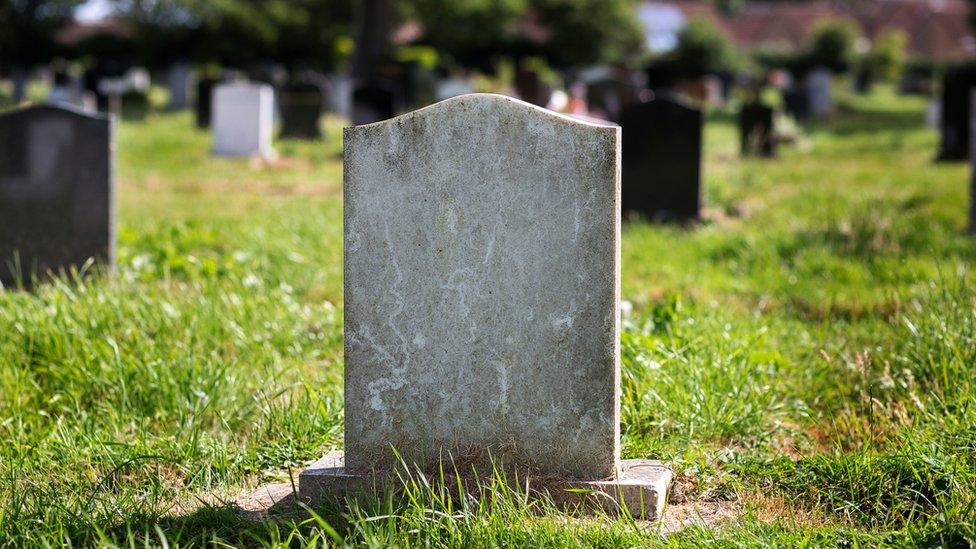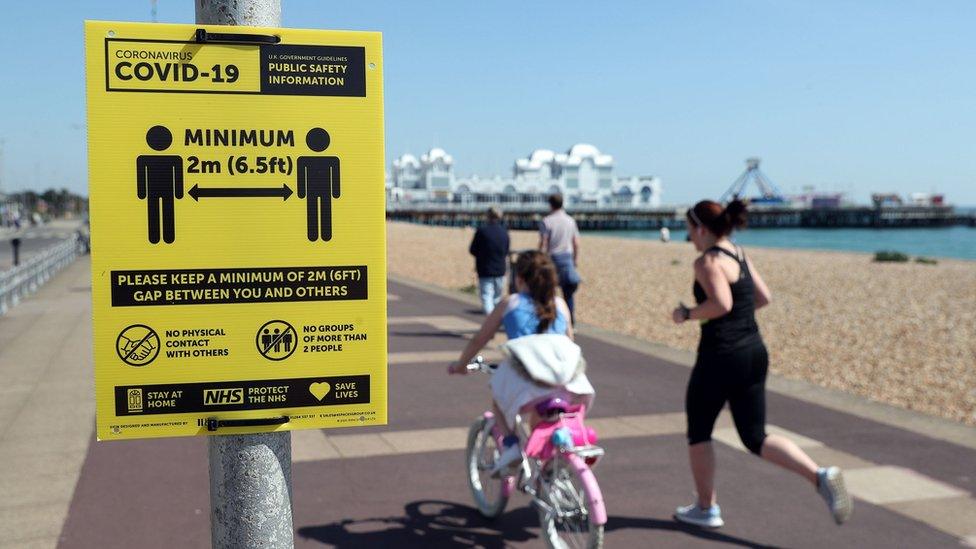Coronavirus: First cemeteries reopen following policy change
- Published

Cemeteries across Northern Ireland have begun to reopen following a decision by the Northern Ireland Executive.
Graveyards were closed to the public in March due to lockdown measures.
On Friday the executive agreed to reopen cemeteries following calls from the public.
First Minister Arlene Foster said it was about "balancing public health concerns with the basic human need to visit a loved one's grave".
The legislation was officially changed on Friday night after the executive discussed the matter at a lengthy meeting.
Cemeteries are operated by Northern Ireland's 11 councils, which must implement measures to ensure social distancing.
Mid-Ulster Council, Fermanagh and Omagh District Council and Antrim and Newtownabbey Borough councils said their cemeteries would open from Saturday morning.
Derry and Strabane District Council said its cemeteries would reopen from Saturday afternoon, with a one-way system and a cap on numbers at Londonderry's City Cemetery.
Belfast City Council said its cemeteries will reopen from Sunday, with Dundonald and Knockbreda operating normal opening hours and Roselawn and the City Cemetery opening initially on Tuesdays, Thursdays and Sundays

A SIMPLE GUIDE: How do I protect myself?
AVOIDING CONTACT: The rules on self-isolation and exercise
LOOK-UP TOOL: Check cases in your area
MAPS AND CHARTS: Visual guide to the outbreak

A spokeperson for Belfast City Council explained limits were necessary at Roselawn Cemetery, which had the only crematorium in Northern Ireland and therefore served a much larger population and had a higher level of activity on site.
The spokesperson said: "For this reason, it will still be necessary to have some limits on opening hours in order to safely manage the facility and protect our staff and members of the public, as well as ensuring the integrity of the cremation service going forward."
On Friday, Mrs Foster said the chief medical officer, Dr Michael McBride, and chief scientific adviser, Prof Ian Young, had advised the executive that the move was "proportionate and low risk".
Health Minister Robin Swann said the change struck the balance "between protecting public health and not inflicting further suffering on individuals.
"There are a number of people in our community who get great reassurance, mental support and strength by visiting a grave and this step now is a proportionate and empathetic response at this time."
Last week, a paper had been issued to executive ministers asking them to consider the matter, but the parties could not come to an agreement at that stage.
The DUP and UUP had backed the move, Alliance and Sinn Féin voiced opposition for fear it could lead to complacency, while the SDLP wanted to take further advice.
However, Deputy First Minister Michelle O'Neill, who is Sinn Féin's vice-president, said she had since "listened carefully" to calls from the public over the course of this week.
"It's a fine line always to listen to people and understand people's concerns and genuine concerns were expressed," she said.

Earlier this week a Catholic priest, Bishop Donal McKeown, had asked the executive to give "some sense of logic" for the closures
She said the issue would be kept under review.
"It will only be permitted where those in charge of burial grounds can ensure we have compliance with the regulations and appropriate social distancing," she added.
In England, the coronavirus legislation was amended last week to allow cemeteries to open again.
'Not a broad lifting'
Mrs Foster maintained that people must still adhere to advice around social distancing and wakes should not take place ahead of funerals.
She repeated that a maximum of 10 people should attend funerals.
"I know a lot is being asked of you as you grieve, but we would not be asking you this if it was not to help save lives," said the DUP leader.
SDLP leader Colum Eastwood said while the move to reopen cemeteries was a "welcome easement", it was not a broad lifting of the restrictions.
"People are still dying in our communities, health service staff are still putting themselves at risk to keep us safe," said the MP.
Allow X content?
This article contains content provided by X. We ask for your permission before anything is loaded, as they may be using cookies and other technologies. You may want to read X’s cookie policy, external and privacy policy, external before accepting. To view this content choose ‘accept and continue’.
Reacting to the executive's decision, the moderator of the Presbyterian Church in Ireland, Rev Dr William Henry, said it was a "sensible and compassionate response" that would bring comfort to many.
Rev Sam McGuffin, President of the Methodist Church in Ireland, said he too was "content that this situation is about to be rectified".
- Published21 April 2020

- Published22 April 2020

- Published23 April 2020
